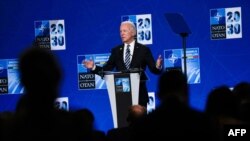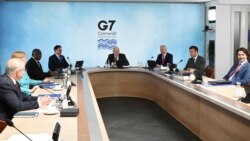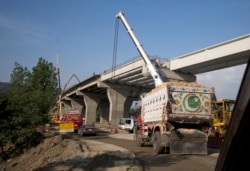The announcement over the weekend that the G-7 would throw its weight behind a U.S.-led proposal to create an alternative to China's eight-year-old Belt and Road Initiative was met with cautious optimism by international development experts.
The experts welcomed the focus on helping low- and moderate-income nations develop needed infrastructure but had many questions about how it would be implemented that defied immediate explanation.
The plan aims to "collectively catalyze hundreds of billions of dollars of infrastructure investment for low- and middle-income countries in the coming years," according to a White House document. It is part of a broader effort being pushed by President Joe Biden, who said this weekend that the G-7 and other democracies around the world are locked in a battle with autocratic regimes like China and Russia to exert influence with developing countries.
The effort, dubbed the Build Back Better World Partnership, is aimed at "rallying the world's democracies to meet the challenges that the world faces, and deliver for our people and for people, quite frankly, everywhere," Biden said.
'An extraordinarily positive step'
"Certainly, the fact that the United States was present and very engaged in the G-7 was an extraordinarily positive step," said Lisa Bos, director of government relations for World Vision, a Christian global humanitarian organization. "That we showed leadership was an extraordinarily positive step. But now, are we going to show the leadership to actually achieve the outcomes and the objectives, and to make those objectives really meaningful?"
Bos said that current circumstances, in which the pandemic has focused attention on the interconnectedness of the world and the value of strong institutions, have created an opportunity of sorts.
"There's a moment in time now where we can really … reinvigorate and reenergize the work that many of the more developed countries are trying to do in creating a safer, more secure, more prosperous, healthier world," Bos said. "If it's not going to happen now, then when? We're at a really critical moment and ... now's not the time to back off. Now's the time to press the gas."
Sustained follow-up necessary
"I think it's really positive that the G-7 countries recognize the issue and recognize a need to react," said Eric Farnsworth, vice president of the Americas Society/Council of the Americas. "There are real needs out there that need to be met. And folks in emerging markets and elsewhere, as well, if they don't see solutions coming from the democracies, are looking for a solution wherever they can get one. And China, of course, has a lot of money."
To be successful, the B3W initiative, as the Biden administration is calling it, will require sustained effort from all the countries involved, Farnsworth said. The G-7 is made up of wealthy, highly industrialized nations, including Canada, France, Germany, Italy, Japan, the United Kingdom and the U.S.
"You can make the announcement, but the key is going to be not just follow-up but meaningful, sustainable follow-up, so that it's not a one-off … but it's actually a priority," he said. "Sustainability, in my view, is key, as well, because, you know, this has to be something that people know that they can rely on … that if they sign up to a compact or some such thing with the U.S. or the EU, that it will still be operational three years from now or five years from now."
Not exactly competition with Beijing
While presented by Biden as an explicit challenge to China, it's notable that the areas on which the plan will focus — climate, health and health security, digital technology, and gender equity and equality, according to the White House — are not really in direct competition with much of what China has been doing through the Belt and Road program.
China's focus has largely been on big-ticket projects that fall under the category of traditional infrastructure investment, including ports, highways, airports, dams, and so on.
That is not to say the areas identified as the focus of the B3W program are not in need of significant investment.
Vital and interrelated
"Each of these four areas is important, and they are interrelated," said Michelle Brown, associate director of advocacy for Action Against Hunger.
"COVID has demonstrated that a lack of investment in critical infrastructure in health and health security can have devastating consequences. The lack of basic services exacerbated the impacts of the pandemic in both rich and poor countries. Social, economic and gender inequalities further deepened the negative impacts of COVID," she said.
The effects of climate change and a lack of digital infrastructure in the most underdeveloped parts of the world, she added, only further contributed to the damage wrought by the pandemic.
More constraints
It is highly unlikely that the B3W program will be able to operate with as few constraints as Beijing can under one-party rule.
The Belt and Road Initiative has frequently involved bilateral funding agreements between Chinese banks and developing countries, with the infrastructure projects themselves serving as collateral for the loans. The U.S. and its partners, operating in democracies with clear demarcations between the state and private businesses, won't be able to direct funding with that kind of precision.
Instead, the B3W project will have to mobilize private and intergovernmental agencies, likely through programs of loan guarantees and other financing measures that require far more in the way of transparency and risk mitigation than Beijing has demanded.
Complexity could be a good thing
Beijing's freedom to act as it sees fit in cutting Belt and Road deals has not always been beneficial, neither for China nor the countries supposedly benefiting from the program.
In a number of cases, countries have found themselves unable to service the loans that China extended, creating concerns that Beijing's status as creditor gives it unusual leverage over domestic policy decisions that might affect Chinese firms.
In other cases, projects have been undertaken without the involvement of communities that would be most affected by them. Some, including an ongoing port project in Peru, have damaged the local environment and disrupted the livelihoods of people they were ostensibly meant to benefit.
Still others, like the Coca Codo Sinclair Dam in Ecuador, have caused embarrassment to all parties involved due to poor planning and shoddy execution that caused projects to fail to deliver on the promise of economic benefits that spurred their construction in the first place.
Opportunity awaits
According to Farnsworth of the Americas Society, the Build Back Better World Partnership has at the very least a chance to reassert the position of democratic nations as the best alternative for developing nations going forward.
That is, he said, if Biden and other leaders can frame it as a strategic benefit for their various constituencies to take a global leadership role as the world recovers from the COVID-19 pandemic, rather than leaving China to help developing countries pick up the pieces.
"This isn't just a matter now of finance and debt repayments and things like that, but there is a strategic narrative here about whether the West can respond, or whether China is the de facto lender of last resort going forward," Farnsworth said.
Chinese diplomats were dismissive of the results of the G-7 summit, with a spokesperson from the Chinese embassy in London telling Reuters that "the days when global decisions were dictated by a small group of countries are long gone," and adding, "We always believe that countries, big or small, strong or weak, poor or rich, are equals, and that world affairs should be handled through consultation by all countries."









